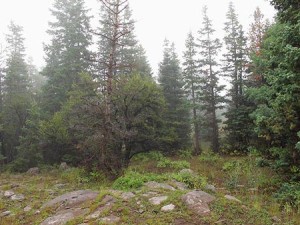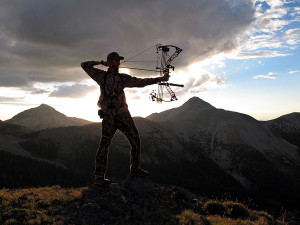Zen in Hunting Part 3
By now you probably have a pretty good understand of what Zen is. But how does a person go about achieving Zen enlightenment? What is the process?
Students in traditional Eastern Zen often spend many years in painstaking study to achieve Zen enlightenment. Since most of us don’t have the wherewithal to travel to Japan for formal study, my aim is to guide you through the basic process. The following steps show how to achieve Zen through archery.
- Concentrate on your breathing.Whatever activity you are doing, Zen begins with meditation, and meditation begins with conscious breathing. When you concentrate solely only on breathing you are brought into the present moment. I’m talking about deep, slow breaths from the bottom of your stomach. Here’s a simple exercise: Breathe in through your nose for four seconds, hold it for two, exhale through your nose for four seconds, count to two, and repeat. Since breathing happens in real time, mindful breathing will bring your focus into the present moment. Zen is all about increased awareness by keeping the mind present. To make way for Zen you must not let your mind wander into the future or the past. Consciously acknowledge any thought that enters your mind, and say to yourself, “I release you.”
- Make archery a ritual.Whatever you are doing–whether sitting down to play the piano or shooting archery—take your time and make each step—each movement—deliberate. Break the process down into multiple small steps and focus intently on each step individually. Do not anticipate the shot, rather stay present throughout the process. Turning your activity into a meditative ritual will pave the way to higher awareness, or Zen.
- Practice makes perfect.Practice shooting in a quiet, calm, yet focused manner. Release all expectations, all physical and mental stress. Begin by shooting at nothing; just a blank backstop. Let the shot come by surprise. Let the bow shoot itself. Do not judge any shot as a hit or a miss. Blank bale shooting removes your self from the process. The arrow will hit the bullseye every time as long as you don’t let your self get in the way of the arrow. Practice in this manner until the basic fundamentals of archery are set firmly in your consciousness. Shooting with a Zen-mind is like playing music. The first time you sit down at the piano you can’t expect to play a symphony, but just a single note. Zen only happens after countless hours of mindful practice. Suddenly the piano plays itself. You are able to conduct pure, enlightened inspiration by letting the process happen through you, not from you.
- Let go.Whatever you are doing, don’t force it. Zen happens by letting go of expectations and dissolving your ego. Only then can a greater force work through you. In Zen you become as a “hollow bamboo.”The Zen-master encourages his student to stop trying so hard. When you finally master Zen in archery—following countless hours of shooting—you will hit the bullseye every time with little to no effort. You only miss when your ego takes over and you begin to over-think the shot. As your skill increase, your ego tries to take credit for success. More and more you believe you are in control. You seek praise. That’s just human nature. And that’s where things fall apart. Progress stifles and you fall into ruts. Instead, let go of your self and let the bow—in it’s perfect, precise form—shoot itself.
Is that it? Did I miss something? Like I said from the start, Zen isn’t something to be explained, but experienced. Practical Zen doesn’t always require you to go through a specific ritual or meditation. These are just guidelines to help you learn the process.
Zen is actually more common than you might think. In fact, I am certain that just about everyone has experienced Zen at one time or another. Have you ever hears someone say, “Man, I’m really in the zone today?” What they mean is, they’re really in the Zen today. For some unknown reason you just feel unconquerable, like you can do anything. The problem is that it’s fleeting; we can’t repeat it. Why?
Most of the time we don’t reflect back on what factors led up to that fleeting moment of enlightenment. Other times we call it luck; and since luck can’t be repeated, it’s dismissed.
The goal of Zen enlightenment is to summon those powers at will and use them to your benefit. The famous virtuoso guitarist Steve Vai explained it like this (and I paraphrase): Every once in a while a person latches onto a fleeting moment of inspiration. For some mysterious reason he can suddenly play beyond his normal abilities—beyond anything he’s ever experienced. But then, a moment later it’s gone. Vai goes on to explain that his unwieldy virtuosity is the result of learning how to hold onto that moment—to summon it at will. Incidentally, Vai is an adamant student of Eastern philosophies. He is speaking specifically of Zen.
Zen isn’t a religion per se, nor does it conflict with any religion. It is simply a heightened state of being and awareness. It brings clarity through meditation and focus.
At its peak, Zen enlightenment channels energy so that God can work through you. In other words, you are able to achieve great feats because you’ve removed yourself as a stumbling block to the great flow of energy. As the late, great Zen-master Alan Watts once wrote, “What the culture of Zen proposes is that one might become the kind of person who, without intending it, is a source of marvelous accidents.”
Best of all, Zen is universally available to everyone. It’s your birthright. It comes with the gift of consciousness. Personally, I’m only at the beginning of Zen understanding. But lately I find myself making more frequent, conscious, ritualistic efforts to channel those forces. I can also recognize when it happens and hold onto it longer.
What I’m attempting to do here is share this understanding with you. Through Zen practices one can achieve greater success in whatever aspects of life he wishes to pursue.




